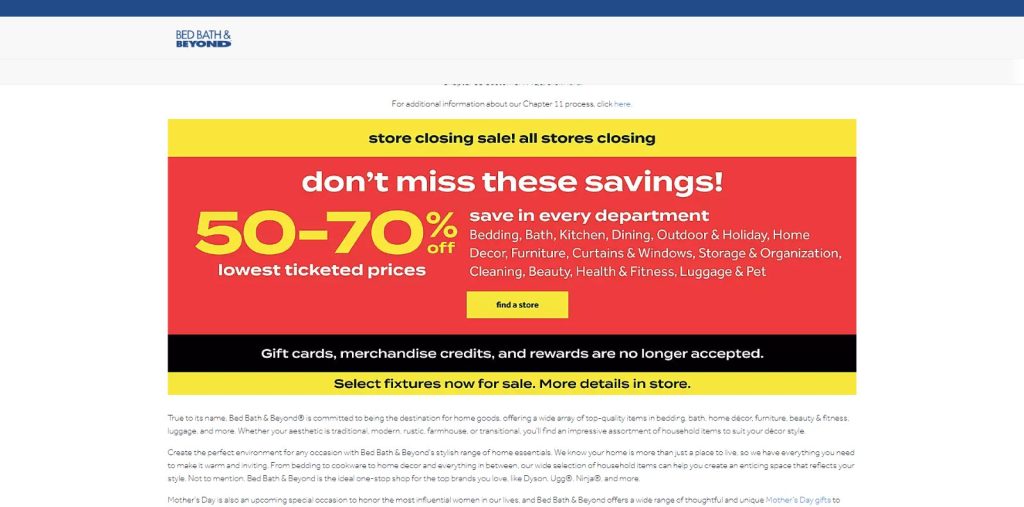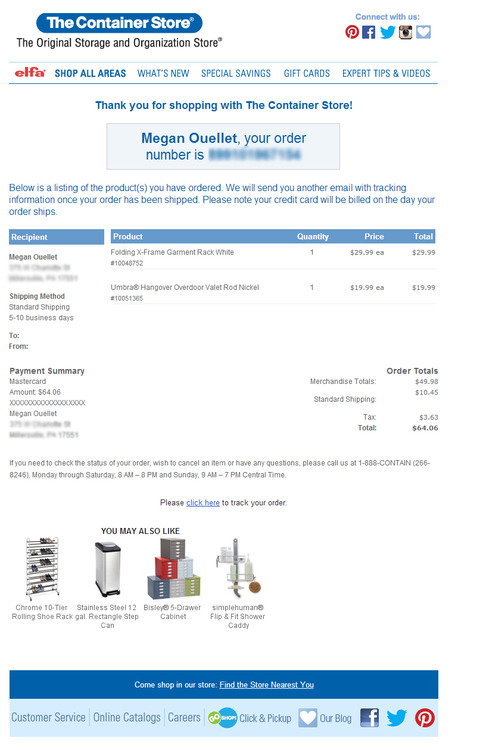Bed Bath and Beyond Clearance Sales Scam
Bed Bath & Beyond filed for bankruptcy in April 2023 and closed hundreds of stores. Scammers have since been using the company’s branding to steal personal information.
How the Bed Bath & Beyond Scam Works
Scammers create fake websites that look like the real Bed Bath & Beyond website. They then post ads for clearance sales on social media or other websites. When people click on the ads, they are taken to the fake website.
The fake website looks like the real Bed Bath & Beyond website, but there are some red flags that you can look for. For example, the website may have a different URL than the real Bed Bath & Beyond website. The prices on the fake website may be too good to be true. And the website may not have a secure checkout process.
If you enter your personal information on a fake Bed Bath & Beyond website, the scammers can use it to steal your identity or your credit card number.
Addtionally, there are also some phishing E-mail campaigns targeting customers who are interested in the Bed Bath & Beyond Clearance Sales.

Bed Bath & Beyond Social Media Scams
Numerous social media posts have surfaced, promoting supposed clearance sales for Bed Bath & Beyond items.
One post displayed a picture of a store closing sale, advertising items from $6.99, while another claimed clearance items were available starting at $9.99. However, these posts have been flagged as potential scams.


Bed Bath & Beyond Phishing Website Alert
We’ve recently detected several scam websites impersonating Bed Bath & Beyond. These sites masquerade as legitimate sales platforms but are designed to illicitly gather personal information, including credit card details. Another site mentioned in a separate post, suewat.com, triggered a Google Chrome warning for attempting to steal user information.
These Bed Bath closing scam websites are the following:
cyirafa[.]shop
sofaclearance[.]shop
olkbmon[.]shop
yusicoun[.]shop
wallisr[.]shop
prudencei[.]shop
clissal[.]shop
peneloper[.]shop
furniturehomes[.]shop
furniture-shop[.]store
furnituresale[.]shop
bpoeqe[.]shop
ryeatitle[.]com
closingstore[.]shop
bedbathclose[.]com
bedbathclosing[.]com
bedbathsales[.]com
aptatall[.]com
caprchain[.]com
bedbath-discount[.]com
Bed Bath & Beyond Phishing e-Mail
In recent instances, some customers have fallen victim to deceptive “spoof” or “phishing” emails that mimic the appearance of legitimate communications from Bed Bath & Beyond and Overstock. These fraudulent emails cunningly request sensitive information, putting recipients at risk of falling prey to identity theft. It’s crucial to recognize that these emails are orchestrated by malicious actors seeking to exploit personal information for nefarious purposes.
Despite initial appearances, these scam emails display seemingly genuine sender addresses (e.g., info@bedbathandbeyond.com), masking their fraudulent nature. Closer scrutiny reveals their true intent – these emails are outright fabrications.
These fraudulent messages often incorporate text and graphics sourced from authentic websites to appear convincing. The content within the email may coerce recipients into divulging private data, such as Bed Bath & Beyond and Overstock account credentials, social security numbers, or credit card details. Alternatively, the email might include links that direct recipients to counterfeit web pages, designed to trick individuals into revealing their personal information.

How to Avoid Falling for the Scam
Here are some tips to help you avoid falling for the Bed Bath & Beyond clearance sales scam:
- Only shop on the real Bed Bath & Beyond website, which is www.bedbathandbeyond.com.
- Be suspicious of any website that offers clearance sales that seem too good to be true.
- Make sure the website has a secure checkout process. This means that the website will use encryption to protect your personal information.
- Never enter your personal information on a website that you don’t trust.
If You Think You’ve Been Scammed
If you think you’ve been scammed, there are a few things you can do:
- Contact your credit card company and report the fraud.
- File a report with the Federal Trade Commission (FTC).
- Be sure to monitor your credit report for any unauthorized activity.
- Protect Yourself from Scams
Here are some general tips to help you protect yourself from scams:
- Be careful about what information you share online.
- Don’t click on links in emails or text messages from people you don’t know.
- Be suspicious of any website that asks for your personal information.
- Only shop on secure websites.
- Keep your software up to date.
Security risks and online frauds are everywhere, it is recommened to protect your identity with Trend Micro ID Protection, an all in one identity theft protection solution that covers brower extension, mobile apps and online portal.
Benefit from web threat protection, which actively notifies you about potential scams and phishing hazards during your internet browsing. Simultaneously, establish vigilant identity monitoring to promptly respond to potential alerts.
